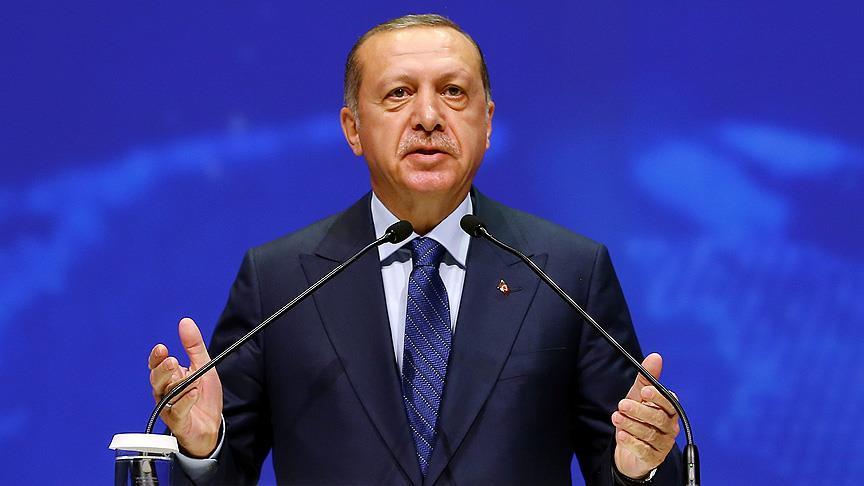Erdogan urges 'immediate' end to Al-Aqsa restrictions
Turkish president condemns use of excessive force at Jerusalem's Al-Aqsa compound by Israeli forces

By Fatih Hafiz Mehmet, Kubra Chohan, Sibel Kurtoglu and Selma Kasap
ANKARA
Turkey’s President Erdogan on Saturday called for an immediate end to Israel’s new restrictions at the compound of Jerusalem’s Al-Aqsa Mosque.
"Metal detectors and other restrictions should be immediately lifted and returned to the status quo. Everyone should be guard against provocations at this sensitive time," Recep Tayyip Erdogan said in a written statement.
“As the summit term president of the Organization of Islamic Cooperation [OIC], I call for the international community to act to immediate end practices that restrict freedom of worship.”
Erdogan said that Israel shutting down the Al-Aqsa compound last week for three days, and then imposing new restrictions -- including placing metal detectors at the entrance -- and citing the deadly July 14 shootout to justify this, is "unacceptable."
"As OIC Term President, I condemn Israeli forces’ use of excess force on our brothers gathered for Friday prayer, the Friday prayer not being allowed in the Al-Aqsa Mosque compound, and Israel’s persistence in its attitude despite all warnings," he said.
Erdogan added: "I wish Allah's mercy upon our three brothers who lost their lives” in yesterday’s violence.
He also wished a speedy recovery to the hundreds of wounded, saying that Turkey is against every type of violence.
He called on Israel to respect the holiness and historical status of the Al-Aqsa compound, saying this is its legal duty.
Deputy Prime Minister Bekir Bozdag also reacted Israeli restrictions on Jerusalem’s Al-Aqsa Mosque on his official Twitter account, condemning Israeli government's "disrespect to Muslims' place of worship".
Bozdag said Islamic countries must be united against Israeli government's "unjust, disrespectful and unlawful" attitudes.
The restrictions and obstacles Israeli government imposed on all Muslims, particularly on Palestinians, can never be tolerated, Bozdag said.
He went on to say that international community and organizations should also say ''stop'' to Israeli government's disrespectful and aggressive attitude.
Anger over restrictions
Anger has spilled over across the West Bank since last week when Israel shut the Al-Aqsa Mosque, revered by both Muslims and Jews, who call it Temple Mount, following a deadly shootout.
The mosque was reopened after a two-day closure, with Israel installing metal detectors at the mosque gates, which Palestinians say aim to change the status quo -- a delicate balance of prayer and visiting rights.
Israel, for its part, has refused to remove the detectors, claiming the security measures are similar to procedures taken at other holy sites around the world.
Israel occupied East Jerusalem during the 1967 Six-Day War.
It later annexed the city in 1980, claiming all of Jerusalem as the Jewish state’s "eternal" capital -- a move never recognized by the international community.
Sacred to Muslims, Jews, and Christians, Jerusalem is home to the Al-Aqsa Mosque, which for Muslims represents the world's third-holiest site.
Erdogan, Macron discuss Al-Aqsa, Gulf row
Separately, Erdogan had a phone call with French President Emmanuel Macron, presidential sources said on Saturday.
The two leaders voiced their concerns over the restrictions at Al-Aqsa as well as tension due to the losses of life.
Erdogan and Macron agreed to work together to ensure peace and resolve the problem, added the sources, who asked not to be named due to restrictions on speaking to the media.
The two leaders also discussed the ongoing Gulf crisis ahead of Erdogan’s two-day visit to Saudi Arabia, Kuwait, and Qatar beginning tomorrow.
They said the problem would be solved through dialogue and discussions.
Last month Saudi Arabia, Egypt, the United Arab Emirates and Bahrain cut diplomatic ties with Qatar and imposed a sea and land blockade while accusing Doha of supporting terrorism.
Doha denies the accusation, calling the blockade a violation of international law.
Turkey has asked Saudi Arabia, as the strongest country in the region, not to allow the crisis to grow into an even bigger one.




